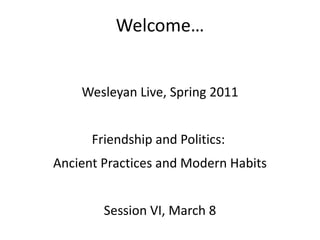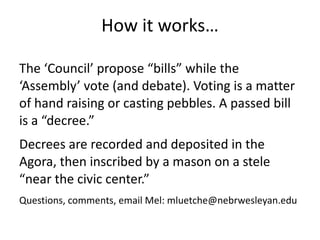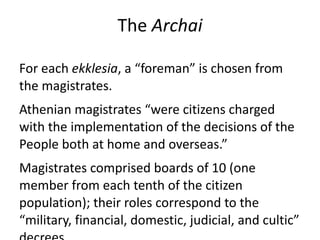Ekklesia
- 1. Welcome… Wesleyan Live, Spring 2011 Friendship and Politics: Ancient Practices and Modern Habits Session VI, March 8
- 2. From myth to practice? Emphasis on certain creation “myths” yields an understanding of social relationships in terms of Philia (friendship) and Eris (conflict) While Aristotle tries to understand how “friendships come to be,” the agon evolves as a practice that manages conflict between friends… Questions, comments, email Mel: mluetche@nebrwesleyan.edu
- 3. A Look at Athenian Assembly As an ekklesia (“calling out”) the Assembly met on a “sloping, rocky hill,” the Pnyx, near the Agora (marketplace). The Pnyx accommodates 6,000 citizens (adult males; the citizen population of Athens ranges between 21,000-30,000, suggesting an “urban minority” in attendance). Questions, comments, email Mel: mluetche@nebrwesleyan.edu
- 4. The Ekklesia Comprised of two bodies: the ‘Assembly of the People’ and the ‘Council of 500’ While the ‘Assembly’ constitute the citizens who attend, the ‘Council’ is chosen by ‘lottery’ from the 139 demes; the number of Council members is determined by the population of the deme. A Council member serves for one year only; can serve twice in a lifetime Questions, comments, email Mel: mluetche@nebrwesleyan.edu
- 5. How it works… The ‘Council’ propose “bills” while the ‘Assembly’ vote (and debate). Voting is a matter of hand raising or casting pebbles. A passed bill is a “decree.” Decrees are recorded and deposited in the Agora, then inscribed by a mason on a stele “near the civic center.” Questions, comments, email Mel: mluetche@nebrwesleyan.edu
- 6. Topics of Assembly… While grain supply must merit discussion, of the 600 remaining decrees, approximately 300 are “honorary” 200 concern military/foreign policy decisions 100 concern “finances, festivals and cults, judicial matters,” and procedure Who’s in charge? Who enacts decrees? Questions, comments, email Mel: mluetche@nebrwesleyan.edu
- 7. The Archai For each ekklesia , a “foreman” is chosen from the magistrates. Athenian magistrates “were citizens charged with the implementation of the decisions of the People both at home and overseas.” Magistrates comprised boards of 10 (one member from each tenth of the citizen population); their roles correspond to the “military, financial, domestic, judicial, and cultic” decrees. Also determined by lottery, minimum age is 30.
- 8. “ The legislature is a taillight, not a headlight…” “ On balance, public attitude has more weight than law. We are more likely to mow our lawn and improve the looks of our house because of the neighbors than because of law…The legislature is a taillight, not a headlight, with rare exceptions. We must wait for the public to support a law before passing it. Leadership comes in helping to educate the public on what laws would be beneficial” ( The Politics of Faith , pp. 112-13)








